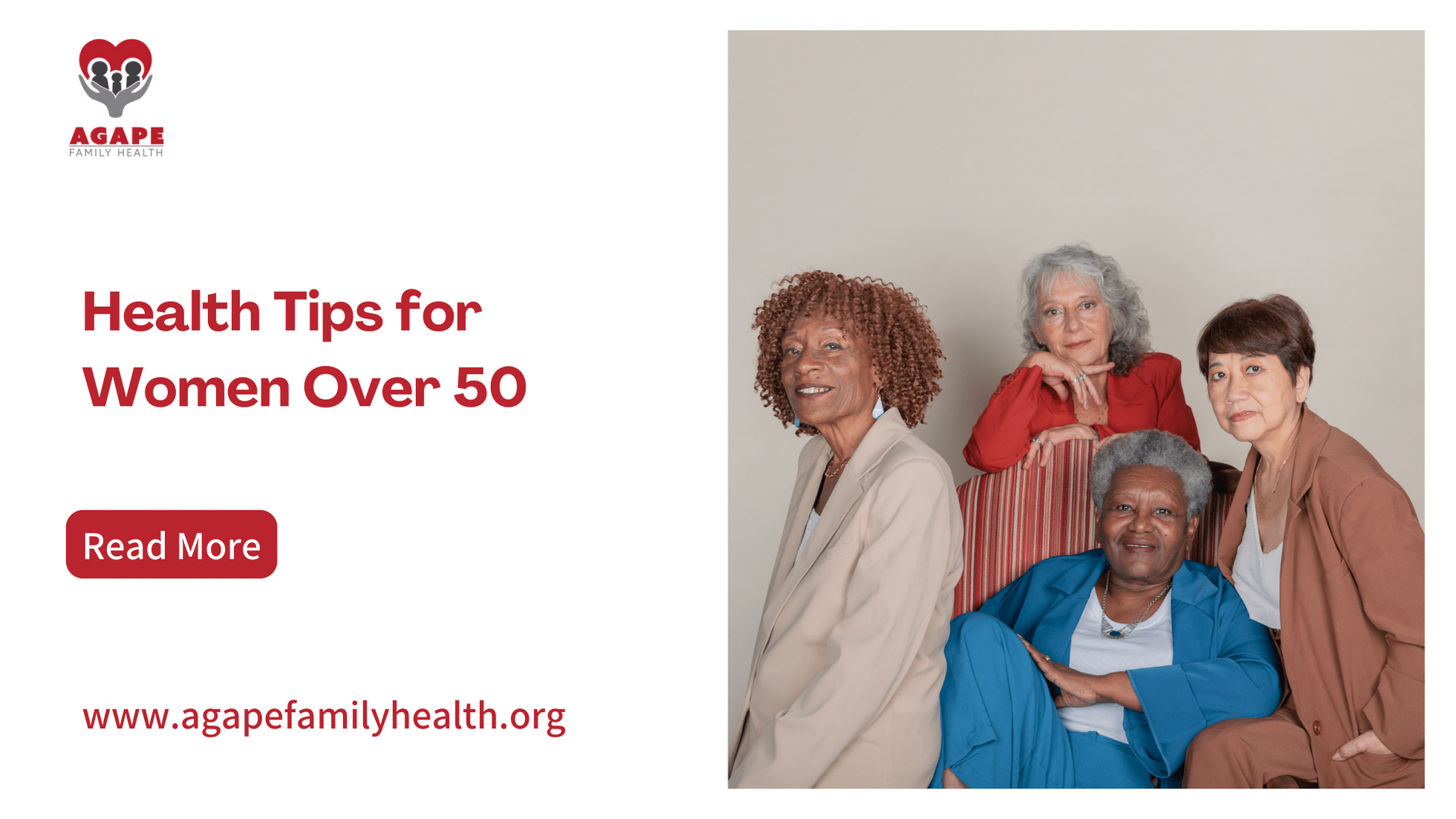As we commemorate Women’s History Month, it’s vital to focus on the health and well-being of women over 50, a stage of life marked by significant transitions, including menopause. The World Health Organization (WHO) emphasizes the importance of understanding menopause as a natural part of aging, indicating that most women experience menopause between the ages of 45 and 55. This period brings about a range of physical, emotional, and mental changes that can affect a woman’s quality of life. Here, we offer valuable health tips for women over 50 to support women in navigating these changes with confidence and knowledge.
Menopause and Its Effects on Women’s Health
Understanding menopause and its impact is essential for recognizing the changes women experience during this significant phase of life. Menopause signifies the end of menstrual cycles and reproductive years for women. This transition is primarily due to a decline in the function of the ovaries and the levels of estrogen, a key hormone in the female reproductive system.
Physical Changes and Symptoms
The decline in estrogen levels during menopause can lead to various physical health challenges:
- Hot Flashes and Night Sweats: Sudden feelings of warmth, often most intense over the face, neck, and chest, can cause discomfort and disrupt daily activities and sleep.
- Osteoporosis: Lowered estrogen levels contribute to a decrease in bone density, increasing the risk of fractures and osteoporosis.
- Cardiovascular Diseases: The protective effect of estrogen on the heart diminishes after menopause, raising the risk of developing cardiovascular conditions, including heart disease and stroke.
Emotional and Mental Health Impacts
Menopause can also have profound effects on emotional and mental health:
- Mood Changes: Fluctuations in hormone levels can lead to mood swings, irritability, and increased susceptibility to stress and anxiety.
- Depression: Women may experience a higher risk of depression during the menopause transition, partly due to hormonal changes, sleep disturbances, and other menopause-related symptoms.
- Cognitive Changes: Some women report difficulties with memory and concentration during menopause, although these symptoms can also be influenced by sleep disruptions and stress.
Social and Lifestyle Impacts
The menopause transition can influence a woman’s social life and relationships. Changes in physical appearance, such as weight gain or skin changes, along with the emotional and mental health challenges, can affect self-esteem and confidence. Additionally, symptoms like vaginal dryness and decreased libido can impact sexual health and intimacy, potentially straining romantic relationships
Increased Health Risks
Another one of the critical health tips for women over 50 is the decline in estrogen levels during menopause. This doesn’t just lead to uncomfortable symptoms; it also increases the risk of several serious health conditions. Osteoporosis, a condition that leads to weakened bones and an increased risk of fractures, becomes more of a concern after menopause due to the role estrogen plays in maintaining bone density. Similarly, the risk of cardiovascular disease rises post-menopause. Estrogen is believed to have a protective effect on the heart and blood vessels, so its decline can lead to an increased risk of heart disease and stroke.
Prioritizing Mental and Physical Health in Women Over 50
Another one of the critical health tips for women over 50 is addressing noncommunicable diseases (NCDs) such as heart disease, diabetes, and cancer. These conditions pose significant health risks that can be mitigated with preventive care, including regular screenings and lifestyle adjustments. Adopting a healthy diet, engaging in regular physical activity, and avoiding harmful habits like smoking and excessive alcohol consumption are key strategies for maintaining physical health and preventing NCDs.
Mental Health Considerations
Mental health deserves equal attention, especially since women are more prone to certain conditions, such as depression and anxiety, during this life stage. It is essential for women to seek support for mental health issues and for healthcare providers to be vigilant in recognizing the signs of mental health struggles in their patients. Strategies for supporting mental health include:
- Counseling and Therapy: Professional support can help women navigate the emotional challenges of menopause and aging.
- Stress Management: Techniques such as mindfulness, meditation, and yoga can reduce stress and improve mental well-being.
- Social Support: Maintaining strong social connections can provide emotional support and reduce feelings of isolation.
Other Health Tips for Women
For women over 50, maintaining health and wellness often focuses on common advice like regular exercise, balanced diets, and routine health screenings. However, there are several unique health tips that can offer additional benefits and are not commonly mentioned:
- Practice Mindful Eating: Beyond just eating healthily as health tips for women over 50, mindful eating encourages a deeper connection with food. It involves paying attention to the taste, texture, and smell of your food, which can enhance digestion and signal fullness to prevent overeating.
- Incorporate Balance and Flexibility Training: While cardio and strength training are often emphasized, balance and flexibility exercises such as yoga or Tai Chi can prevent falls, improve mobility, and reduce the risk of injury, which is especially important as bones become more fragile with age.
- Explore Herbal Supplements: Some herbal supplements, under the guidance of a healthcare provider, can support health during menopause. For example, black cohosh and evening primrose oil have been explored for their potential to alleviate menopausal symptoms, though it’s crucial to consult with a healthcare provider before starting any new supplement.
- Prioritize Skin Hydration: Aging skin requires more than just moisturizing. Hydrating from the inside out by drinking plenty of water and using humidifiers can help maintain skin health. Additionally, applying sunscreen daily protects against UV damage, which accelerates skin aging.
- Engage in Cognitive Exercises: Brain health is as crucial as physical health. Engaging in activities that challenge the brain, like puzzles, learning a new language, or picking up a new hobby, can enhance cognitive function and may reduce the risk of cognitive decline.
- Foster Social Connections: Social interaction can boost mental health, lower stress levels, and even potentially impact physical health positively. Joining clubs, volunteering, or staying active in community groups can provide both emotional and social support.
- Consider Pelvic Floor Exercises: Pelvic floor exercises, or Kegels, are beneficial for preventing incontinence, which can become an issue after menopause due to weakened pelvic muscles.
- Adopt an Anti-inflammatory Diet: Inflammation can contribute to chronic diseases, such as heart disease and diabetes. Incorporating foods rich in omega-3 fatty acids, antioxidants, and fibers can help reduce inflammation levels. Examples include fatty fish, nuts, seeds, fruits, and vegetables.
- Integrate Intermittent Fasting: With a healthcare provider’s guidance, intermittent fasting can improve metabolism, aid in weight management, and even enhance longevity. However, it’s essential to approach fasting carefully, especially for those with health conditions or dietary restrictions.
- Regular Vision and Hearing Checks: While regular health screenings are emphasized in health tips for women over 50, specific checks for vision and hearing are crucial as these senses can start to decline with age. Early detection of issues can lead to quicker interventions.
Conclusion
Women’s health over 50 encompasses a broad spectrum of care, from understanding and managing menopause to preventing chronic diseases. With these health tips for women, they can navigate this life stage with strength and resilience. Celebrating Women’s History Month also means acknowledging the importance of women’s health and empowering women with the knowledge and resources to thrive at every age.
Let’s honor the journey of aging as an opportunity to focus on health, well-being, and the continued pursuit of happiness and fulfillment. Women over 50 have immense contributions to make to society, their families, and themselves. By prioritizing health, they ensure that their best years are still ahead, filled with vitality, strength, and wellbeing.



